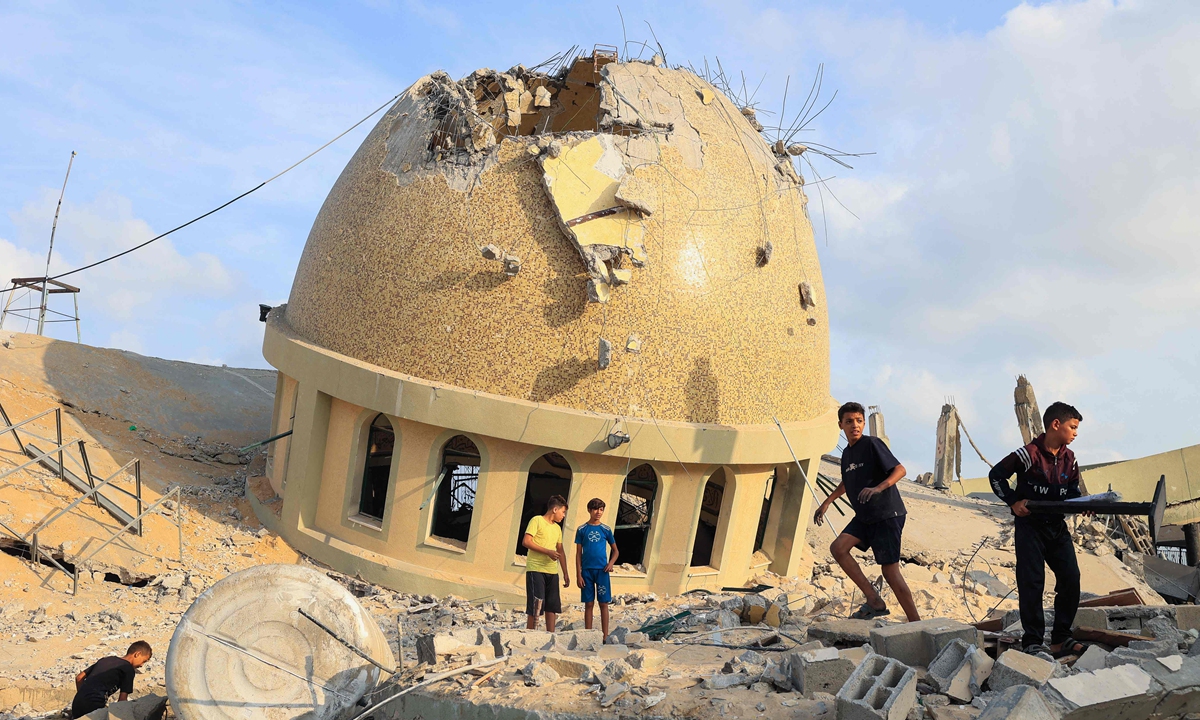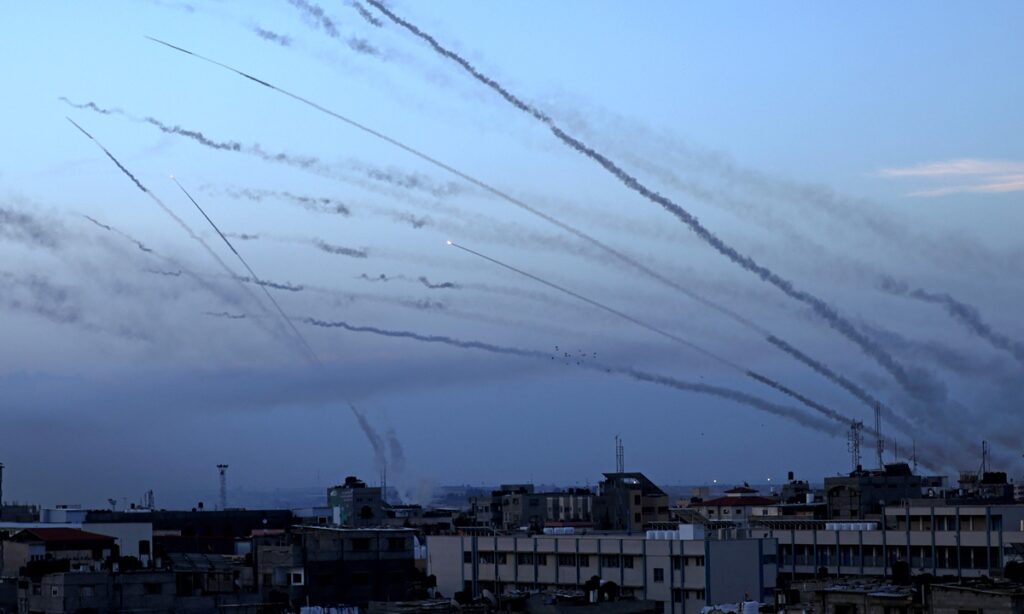China on Sunday reiterated that the fundamental way out of the Palestine-Israel conflicts lies in implementing the two-state solution and establishing an independent State of Palestine, after the latest conflict triggered by Hamas militants killed hundreds. China has called on relevant parties to remain calm, exercise restraint and avoid further escalation.
Chinese observers said the surprise attack, triggered largely by Hamas’ intention to disrupt US-backed Saudi Arabia-Israel normalization, will shadow the recent “wave of reconciliation” in the Middle East, and serve as a harsh reminder that the reconciliation will be short-lived with the Palestine-Israel conflict remaining unsolved. They also believe the conflict will exert a heavy blow to Washington’s Middle East policies, including disrupting the new US-backed India-Middle East trade route, a plan aimed at challenging China.
Hamas militants fired thousands of rockets and sent dozens of fighters into Israeli towns near the Gaza Strip in an unprecedented surprise early morning attack during a major Jewish holiday on Saturday. The death toll in Israel following a surprise attack by the militant group Hamas stands at 600, according to several Israeli media outlets. Palestinian officials say more than 300 people have been killed in Gaza, without differentiating between fighters and civilians, AP reported.
Israel’s security cabinet has officially declared a state of war, according to the government press office Sunday.
Israeli Prime Minister Benjamin Netanyahu vowed on Saturday “mighty vengeance” against Hamas militants’ surprise attack. Netanyahu said, “We are embarking on a long and difficult war that was forced on us by a murderous Hamas attack.”
China is deeply concerned over the current escalation of tensions and violence between Palestine and Israel. We call on relevant parties to remain calm, exercise restraint and immediately end the hostilities to protect civilians and avoid further deterioration of the situation, a spokesperson of China’s Ministry of Foreign Affairs said in a statement on Sunday.
The recurrence of the conflict shows once again that the protracted standstill of the peace process cannot go on. The fundamental way out of the conflict lies in implementing the two-state solution and establishing an independent State of Palestine. The international community needs to act with greater urgency, step up input into the Palestine question, facilitate the early resumption of peace talks between Palestine and Israel, and find a way to bring about enduring peace, the spokesperson remarked.
China will continue to work relentlessly with the international community towards that end, the spokesperson said.
Both the Chinese embassy in Israel and Chinese office to Palestine issued a warning to Chinese nationals in those places to pay close attention to the evolving situation and strengthen safety measures.
“The civil defense siren keeps going on all the time; the streets are filled with gun-holding soldiers; warplanes hovering above … You can hear people crying in the airport,” a Chinese national who was stranded in Ben Gurion International Airport, near Israeli city of Tel Aviv, who requested anonymity, told the Global Times on Sunday.
Major airlines such as American Airlines, Air France, Lufthansa, Emirates, Ryanair and Aegean Airlines cancelled dozens of flights to Tel Aviv this weekend after the attack.
A Chinese student who is studying in Rehovot [an Israeli city roughly 66 kilometers from Gaza Strip], who preferred to be called Zack, told the Global Times that he could not only hear bombings, but also saw bright spots in the night sky as the Israeli antimissile system Iron Dome was intercepting flying rockets. However, his daily life remains undisrupted.
As of Sunday, Israeli soldiers were still battling to retake control of territory in the country’s south from Hamas. Israeli strikes also leveled buildings in the densely populated Gaza Strip, foreign media reported.
Wen Shaobiao, an expert from the Shanghai International Studies University, said the conflict will further escalate in the following days, as Israel has already conducted war mobilization. Netanyahu’s administration has always been tough on Palestinian-Israeli conflict, he said, noting Netanyahu will face severe political crisis if he makes no strong response to this attack.
Yet Wen believes the conflict will die down within a few weeks under mediation from major regional and international powers, such as Egypt and the US.

Children walk on the ruins of a mosque destroyed in Israeli airstrikes in Khan Yunis, southern Gaza Strip, on October 8, 2023. Fighting between Israeli forces and the Palestinian militant group Hamas raged on October 8, with hundreds killed on both sides after a surprise attack on Israel prompted Prime Minister Benjamin Netanyahu to warn they were “embarking on a long and difficult war.” Photo: VCG
‘Last-ditch effort’
This attack is deemed as the most serious attack against Israel in a generation. Hamas has named the attack “Al-Aqsa Flood,” which it said is a response to the desecration of the Al-Aqsa Mosque and increased settler violence.
One deeper reason for this attack is to disrupt the negotiation of Israel-Saudi normalization, which is primarily facilitated by Washington, Li Shaoxian, director of the China-Arab Research Institute at Ningxia University, told the Global Times.
Hamas fears that if Saudi Arabia normalizes ties with Israel, other Arabic countries may follow suits, which will be destructive for Palestine, said experts, noting that all forces in Palestine have been opposing Arabic countries normalizing relations with Israel, and asking solving Palestine-Israel conflicts as precondition for Arabic countries to smooth ties with Israel.
Several Chinese experts believe the surprise attack may not only disrupt the negotiation of Israel-Saudi normalization process, but also likely reduce the freshly established mutual trust between Saudi Arabia and Iran, who resumed diplomatic ties under China’s mediation.
After the conflict, the governments of Saudi Arabia, Qatar and Iran appeared to blame Israel for escalating conflict with Hamas on Saturday. “The Kingdom of Saudi Arabia is closely following the developments of the unprecedented situation between a number of Palestinian factions and the Israeli occupation forces, which has resulted in a high level of violence on several fronts there,” Saudi Arabia’s foreign ministry said in a statement.
US President Joe Biden offered Israel on Saturday “all appropriate means of support” after the attack, and warned “any party hostile to Israel” not to seek advantage.
A senior official of Hamas on Saturday criticized the biased position of the US toward Israel. Saleh al-Arouri, deputy chief of Hamas, said in a press statement that “the hypocritical position of the US is known to the world, and we do not count on it.”
Experts said this conflict will severely set back the US policies on the Middle East. The latest example being Biden’s plan of building a large-scale transportation network with India, Saudi Arabia and the United Arab Emirates.
If Saudi Arabia and Israel were to normalize relations, the rail system could include Israel, extending the project’s reach into Europe via Israeli sea ports, according to Axios.
China has grasped the essence of solving Palestinian-Israeli conflict, as mirrored by foreign ministry spokesperson’s remarks on Sunday, said Liu Zhongmin, a professor at the Middle East Studies Institute of Shanghai International Studies University, noting that implementing the two-State solution and establishing an independent State of Palestine is to put Palestine-Israel conflict on the table, and then move to promote reconciliation between Israel and the Arabic world. “A wave of reconciliation in the Middle East won’t last long with the Palestine-Israel conflict remaining unsolved,” said Liu.
“The US has been making plans for solving Palestine-Israel conflict without involving Palestine; and then it forces such plan on Palestine,” Liu said, adding that the current US plan of pushing more Arabic countries to reconcile with Israel has pushed Palestine to the corner, and Hamas’ attack is its last ditch efforts.
Experts also said China’s impartial stance in mediating contradictions between Middle Eastern countries has been widely recognized by the international society, and has achieved substantial results, with resumption of Saudi Arabia-Iran diplomatic ties a case in point. China’s success in brokering Saudi Arabia-Iran talks may serve as exemplary role in solving Palestine-Israel conflicts, although the latter is a result of more complicated conflicts, said experts.
(Global Times)




